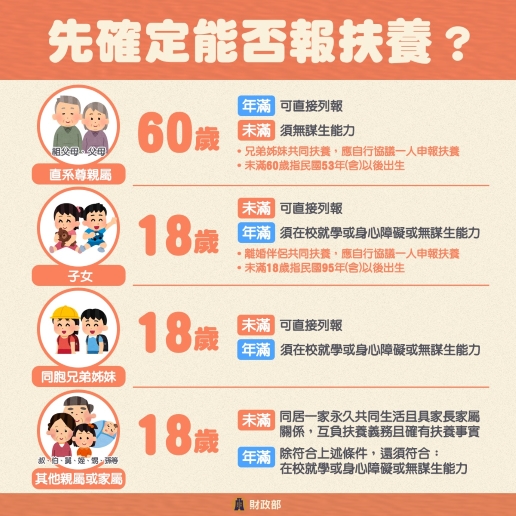Q: How can new residents file comprehensive income tax? Can parents residing abroad be listed as dependents? What supporting documents are required?
A:
(I) Methods of Filing Income Tax:
i.For new residents with a national ID card:
From May 1 to May 31 each year, fill out the tax declaration form and submit it to the National Tax Bureau's branches, tax offices, or service counters. Report the items and amounts constituting the total comprehensive income for the previous year, as well as facts regarding deductions and exemptions. Calculate the final tax payable by subtracting withheld tax and deductible tax amounts, then pay the amount owed before filing.
ii.For new residents with a residence permit only:
★If residing for less than 183 days in the tax year:
The withholding agent will assist in handling tax withholding at the source for non-residents, exempting them from the May tax filing. Alternatively, new residents can file jointly with their domestic spouse as a resident.
★If residing for 183 days or more in the tax year:
The filing process follows the same method as nationals filing comprehensive income tax. New residents with residence permits can opt to be treated as foreign taxpayers filing a comprehensive tax return for foreigners. Alternatively, their domestic spouse can file the return as the taxpayer, with the new resident listed as a spouse filing as a domestic resident.
(II) Can new residents' parents abroad be listed as dependents? What documents are required?
i.Parents of new residents residing abroad, who are aged 60 or above, or are under 60 but incapable of earning a livelihood and are supported by the taxpayer, can be listed as direct lineal ascendants.
ii.Required supporting documents:
★Basic personal information of direct relatives (e.g., photocopies of passports, residence permits, or household registration certificates).
★Proof of relationship (e.g., birth certificates or household registration documents).
★Proof of support (e.g., remittance certificates or notarized documents).
★Proof of existence (e.g., notarized documents, household registration certificates, or other documents confirming their existence).
★For those under 60: Additional proof of incapacity to earn a living (e.g., certificates from public hospitals or documents certified by local government authorities). First Confirm Eligibility for Dependent Deductions (Photo / Sourced from Ministry of Finance FB)
First Confirm Eligibility for Dependent Deductions (Photo / Sourced from Ministry of Finance FB)







